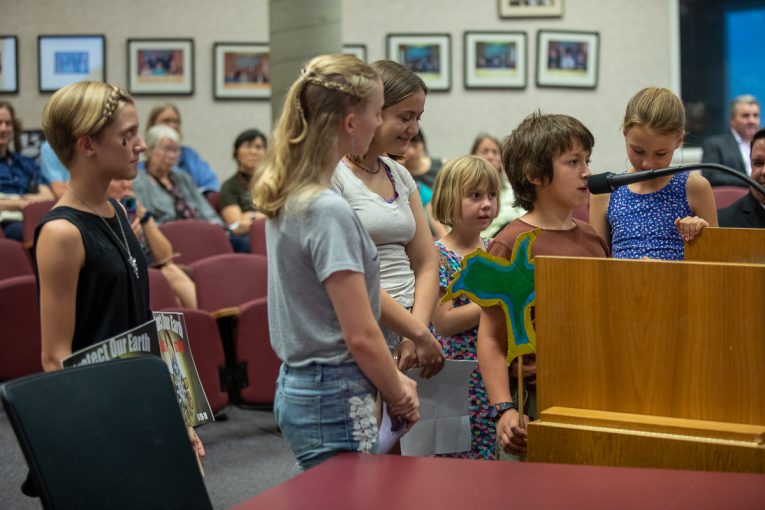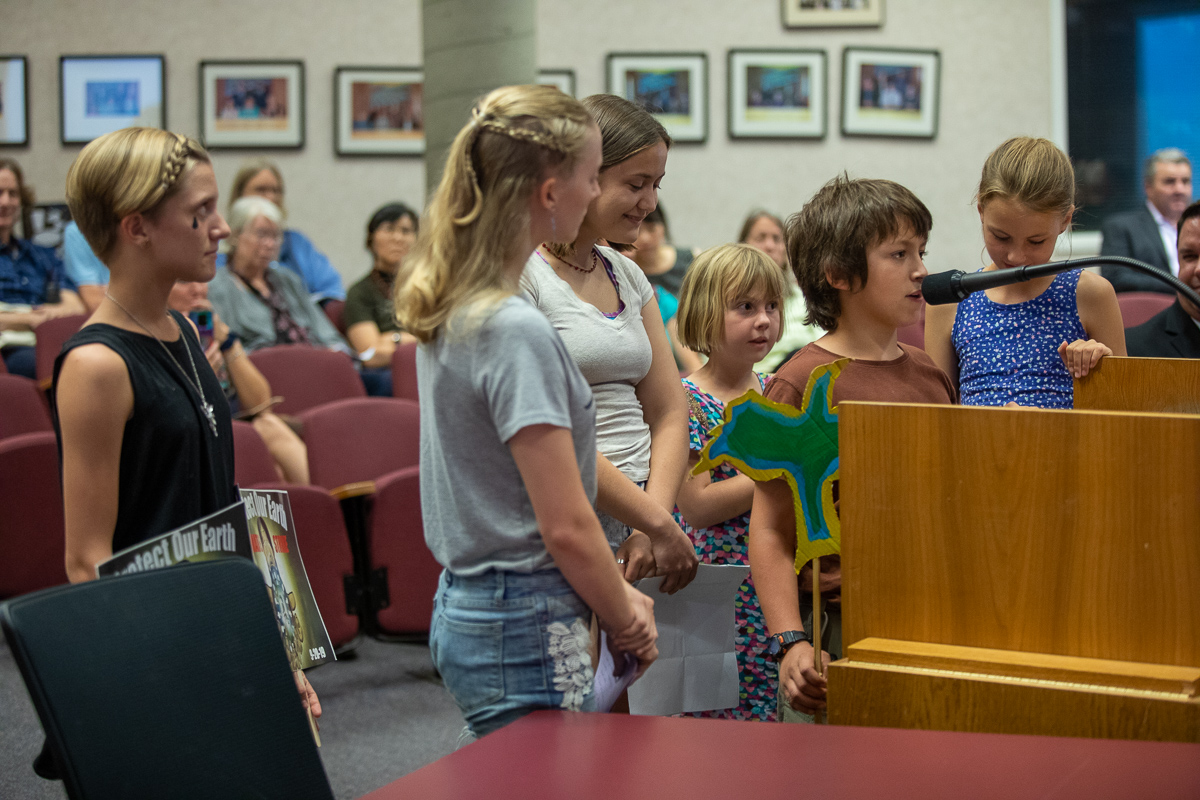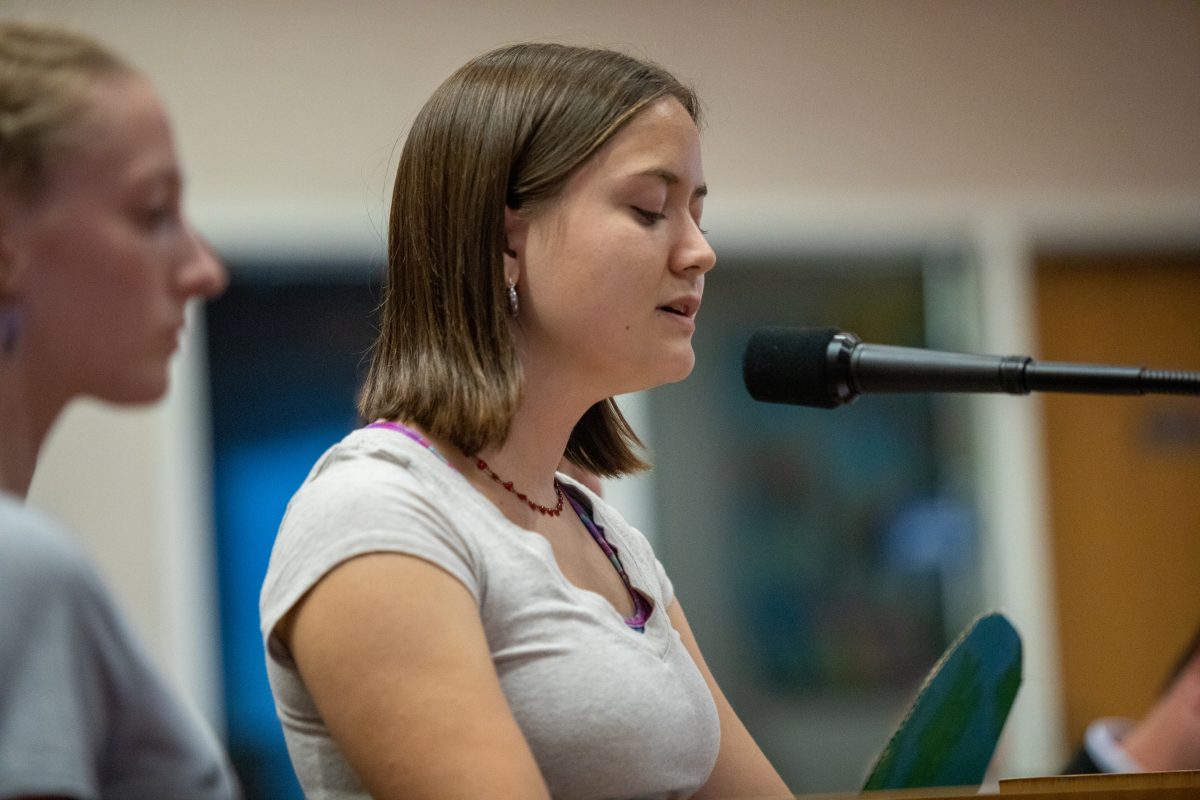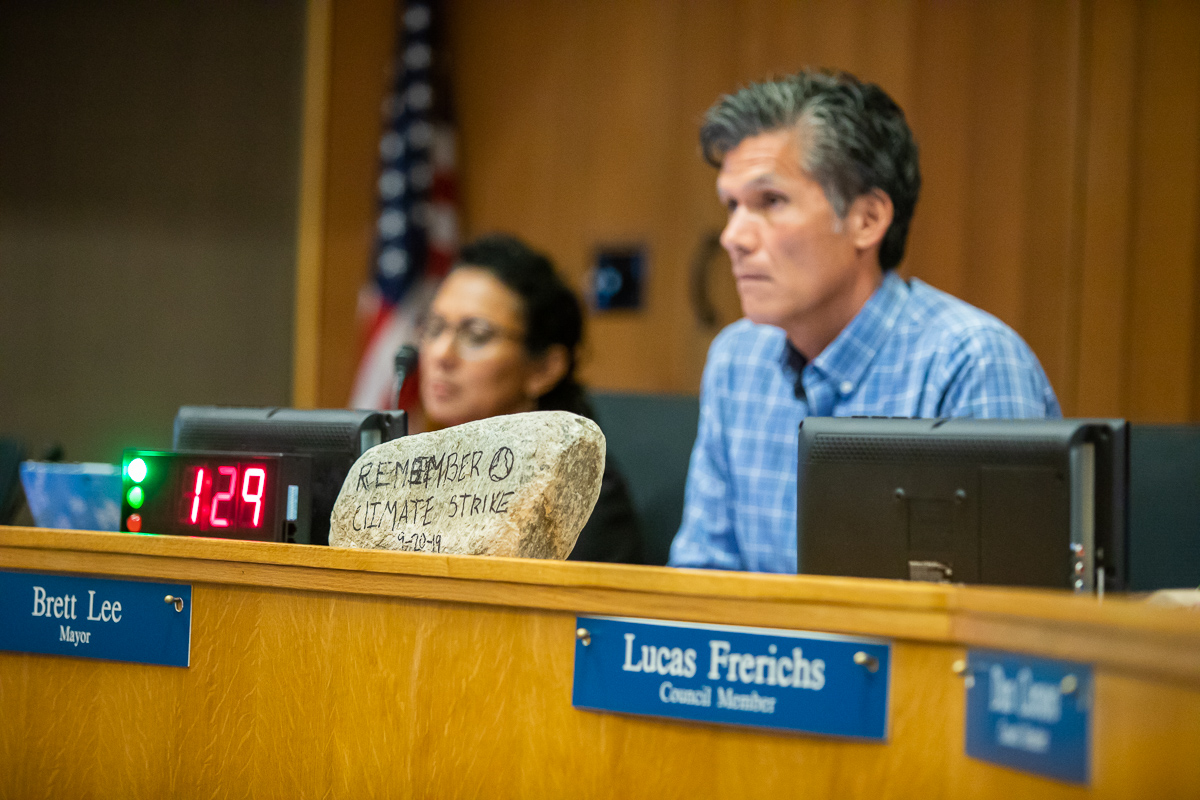

Six students from DJUSD presented a video to the council about Climate Strike.
Amber Crenna-Armstrong, a student a Davis High, was one of the local leaders of the local action last Friday. She read a follow-up letter written by one of their youth representatives, Emma Larson.
“The youth of Davis, following the lead of people all over the world, are declaring that we have a climate emergency on our hands. Our precious planet is dying and everyone is being affected by it.
“We are writing this letter to you, the leaders of our community – demanding that you lead change.
“Davis a very environmentally aware city and we are grateful for that. However we are not talking enough about these issues in our school and some of the kids don’t even know what’s going on in our world.
“Not enough is getting done in our country or our world about these catastrophes. So we need our cities, our districts, our states, and our countries to start doing more to lead the change.

“This is really frightening for us. We constantly hear about the impacts of climate change. We feel the earth changing – with the California fires, we breathe in the smoke. And us, as our youth, cannot understand why the adults and our leaders are not stepping in and making changes.
“For me personally I grieve every day for my future, my children’s future, that I know will be lost due to climate change. This climate crisis robs us of our childhoods. And at this point it is both hugely unfair and wrong that the children of our world feel forced to take a stand due to the neglect and irresponsible behavior of the adults in power and those leading our communities worldwide.
“The leaders in our world are not taking the climate crisis seriously and some are refusing to acknowledge its existence. We need you, the caring and responsible adults in our community, to hold these leaders accountable and to take vital steps to save our planet. The change that we so desperately need is not happening fast enough.
“So we, the youth of Davis, California, our parents, and our earth, demand that the adults running our community, our state, and our country step up and face the greatest challenge of our time – climate destruction.

“The city of Davis has made the commitment to reach net zero emissions by 2030, but we also want the city to find new ways to reduce CO2 emissions, to reduce single-use plastics, to increase public transportation availability in the city and we want to see these steps taken as soon as possible.
“We must change the mental focus from me to we. We all live here together and we have to care for each other and our earth. The sacrifice that we all must make will be worth it. We need to have a healthy home when we grow up and our children grow up and so please help us make this possible.
“As Martin Luther King once said, the time is always right to do the right thing.
“So we need you to step up and do the right thing, if not for your own, then for us, your representatives here – our animals, our plants, our people who are all over the world dying due to this climate crisis.”
The letter was signed by numerous students, representing many more.







The City Council took another big step last night toward reducing GHG emissions by voting unanimously to approve a new Reach Code ordinance that incents all-electric construction for new residences. The final approval vote will be in two weeks, and after approval by the California Energy Commission, should be in place by January 1 next year. That should catch the recently approved large developments at Nishi and West Davis, and many of the large apartment complexes.
The Council earlier this year approved the new commercial Reach Code that adopted the more stringent CalGreen standards. The next effort will be to move toward all-electric code for commercial, similar to what Menlo Park did recently.
The big lifts will be adopting more stringent energy efficiency standards for rental properties, and retrofitting existing buildings with all-electric appliances.
The City also will be updating its climate action plan (CAP) early next year. Look for opportunities to engage in that process as well.
I really prefer cooking with gas.
But in so doing, you’re cooking the planet. Is your preference worth the damage to the planet?
Hey, you want institutional changes, not individual ones, so don’t ask me, ask The Food Channel.
Creating institutional changes will mean individual changes underneath them. If we have to reduce GHG from autos, that is an institutional one, but it means that individuals will have their choices constrained.
But Alan, some prefer to burn gas and coal to generate electricity to cook… despite the losses in energy doing so, it is much more ‘environmentally friendly’…
I, too, prefer NG for cooking… how I learned to cook… just wait until the geniuses require us to give up our stoves, and use electricity, generated by burning natural gas…
Guess you didn’t see David’s graphics from the other day where ~ 27%of NG/other HC used is to generate that clean electricity that doesn’t cook the planet.
Is your preference to generate ‘clean’ electricity by burning NG and coal? At a loss of energy, and an increase in heat generated in the process?
Those graphs don’t show ghg produced
I’m going to guess that gas furnaces use a lot more energy than a gas or electric stove.
But, electric heaters are much more expensive to use, than gas furnaces. So, folks may save money on the purchase price of a new home without gas, but may pay much more in the long run. (Developers are probably “just fine”, with that.)
I’m also going to guess that this is a drop in the bucket regarding global warming, in reference to the difference in choice between the two. Especially when compared to automobile usage.
Forgot about water heaters, as well.
Wondering if they even make “tankless” electric water heaters.
https://home.howstuffworks.com/gas-vs-electric-stoves2.htm
The issue is GHG emissions not efficiency.
You emit GHG with every breath you take… everything you eat produces GHG… when it is harvested, when you body disposes of what you eat… when your body decomposes… we are carbon-based organisms… oxygen is somewhat prevalent.
Focus on inefficient, carbon-based uses… not total bans… electricity comes largely from carbon based substances, solar panels, likewise (mining, manufacturing)… hydro, same… TNSTAAFL…
NG water heaters, stoves heating, are more efficient than electric… and electricity is always generated by sources that include the production of GHG…
Still want to pick up the gauntlet as to who understands environmental science better? I’m still here…
“You emit GHG with every breath you take”
You keep repeating this point but it’s a bad one. That accounts for a fraction of the GHG emitted in the world.
Yes, a fraction…all sources are a fraction. 6+ billion fractions as to breathing, eating, defecating, dying.. all fractions. They add up…
We are carbon-based organisms…we also consume oxygen. Connect the dots…
If you look at the charts I posted a few days ago, one of them showed sources of GHG and another showed GHG produced over time, you see that while the population has grown over the last 50 to 100 years, the amount of CO2 has grown way faster. It is not accounted for by the increase in population, it is accounted for by the increase in technologies that produce GHG. Therefore, making the comment that you did, that people emit GHG is looking at a tip of the iceberg in terms of the vast ocean of gas we are currently emitting. And it’s not a case that every single drop counts. Had there simply been 8 billion humans, it would not be a problem. It’s 8 billion humans each burning fossil fuels and more that’s the problem.
The earth’s human population probably wouldn’t reach 8 billion, without burning fossil fuels (and otherwise degrading the planet).
You do understand there is a link between the two?
Not sure if others have heard of this, but I recall that some use a very high-tech, new-fangled solar technology-based device called a “clothesline”, which doesn’t use gas or electricity – and is easier on clothing as well. Fresher/cleaner, as well.
User friendly, and not much in the way of repair or ultimate replacement bills, either.
Might want to look into that, at least until they outlaw backyards. (But even then, check out old photos of them hanging outside of buildings, in big cities.)
Global warming might even speed up the already-fast drying process, in this climate.
On second thought, it might be best to avoid looking at those old photos outside of tenement buildings, lest you get the wrong idea. (The visual impact of those clotheslines is probably the least of the problems with that situation. Kind of interesting to see, though.)
In any case, I’m surprised that more people don’t take advantage of the natural sunlight and heat to dry clothes, in this area (via racks, clothelines, etc.). Avoiding use of dryers probably also keeps inside temperatures slightly cooler.
Maybe people just don’t want to bother with it these days.
Do you,
We do… despite the fact we have a gas dryer (high efficiency, compared to electric) when Option A is not feasible.
Sure. I (almost) get a “holier than thou” attitude (but not holier than “thee”) when doing so. (Not sure I’m using those terms correctly.)
My comment was more of an observation, although I can’t see into everyone’s backyards. Still, it seemed a lot more common in the “old days” – even well-after dryers were invented.
Regarding students (the subject of this article), I wonder if some think of these things, before tackling global policies. (At least some probably do.)
They still seem rather blind regarding the impact of DJUSD’s policy encouraging non-resident students, though. I strongly suspect that every single one of the non-resident students are driven to school, and perhaps to after-school activities as well.
I dry my laundry on a line. Holier than thous. And my S don’t stink. It’s like a bushel of roses.
Alan… better than a bunch of new-roses…
(Of course, much of the “green revolution” relies upon greenhouse gas-emitting sources in the first place.)